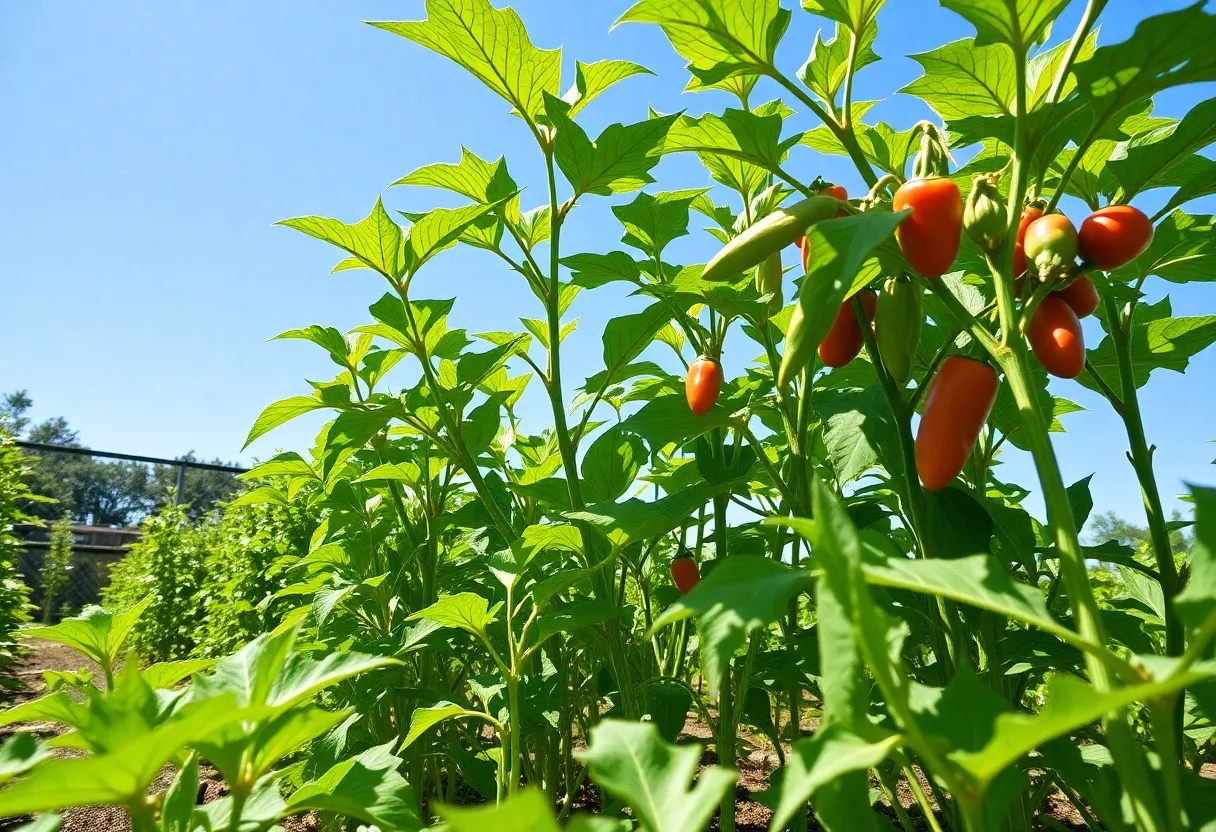7 Must-Do Steps for Building a Thriving Vegetable Garden in Houston’s Heat
1. Select Heat-Tolerant Vegetables
Houston’s climate presents unique challenges for vegetable gardening, particularly during hot summers. The high temperatures and humidity demand careful plant selection. Opt for vegetables specifically suited for such conditions to ensure abundant yields and minimal stress on plants. Heat-tolerant varieties such as okra, sweet potatoes, eggplant, and peppers are ideal choices. These crops have adapted to Houston’s summer environment and can withstand prolonged heat and humidity. Their resilience reduces the risk of bolting, sunscald, and other heat-related maladies, ultimately leading to healthier plants and higher productivity. Selecting the right vegetables from the start is a crucial step in establishing a thriving garden in Houston’s intense climate.
2. Implement Effective Watering Practices
During Houston’s hot months, proper watering is essential for plant health. Watering early in the morning minimizes evaporation and allows plants to absorb moisture before the peak heat of the day. Focus on watering at the base of the plants, targeting the root zone. This technique prevents fungal diseases and reduces water wastage. It’s vital to maintain consistent soil moisture, especially during dry spells. The soil should remain moist but not waterlogged, fostering strong root systems. Drip irrigation or soaker hoses are recommended for precise delivery and efficiency. Consistent watering creates a stable environment for growth and maximizes the yield potential of heat-tolerant crops.
3. Utilize Mulching Techniques
Applying organic mulch around your plants is one of the most effective strategies to combat heat stress. A clearance of 3 inches of mulch—such as straw, wood chips, or grass clippings—helps to retain soil moisture by reducing evaporation. Mulch acts as an insulating layer, moderating soil temperature and protecting roots from extreme heat. It also suppresses weeds, which compete for water and nutrients, and adds organic matter to the soil as it decomposes. Over time, mulching improves soil fertility and structure, supporting healthier and more resilient plants. Incorporating mulch consistently can significantly elevate your garden’s success during Houston’s hot summers.
4. Provide Shade During Peak Heat
Houston’s intense midday sun can cause heat stress and sunburn on sensitive plants. During the hottest part of the day, providing shade can be transformative. Use shade cloths or natural shading methods, such as planting taller plants or structures that shield more vulnerable crops. This practice helps maintain optimal growing conditions, reduces wilting, and prevents leaf scorching. Shading also encourages better soil moisture retention and slows down evaporation, making it easier for plants to thrive. Proper shading strategies are essential, especially during heatwaves or prolonged periods of intense sunlight.
5. Implement Pest Management Strategies
High humidity and heat create an ideal environment for various pests and diseases. Regular inspections are critical to catching issues early. Look for signs of pests such as aphids, whiteflies, or caterpillars, and monitor for disease symptoms like leaf spots or mold. To promote a healthy ecosystem, plant beneficial flowers like marigolds and sunflowers that attract natural predators of pests. When infestations occur, use organic pesticides judiciously, following the manufacturer’s instructions to minimize harm to beneficial insects. A proactive approach to pest management preserves plant health and maximizes yields.
6. Practice Crop Rotation and Soil Enrichment
Maintaining soil health is fundamental to a productive garden. Crop rotation prevents nutrient depletion and disrupts pest cycles. Avoid planting the same family of vegetables in the same spot more than once every season. Incorporate organic amendments such as compost or well-aged manure to enhance soil fertility and structure. Regular soil testing helps determine nutrient levels and guides targeted fertilization. Healthy soil supports robust root development, improves resistance to pests, and enhances overall plant vigor, especially in challenging heat conditions.
7. Plan for Fall Planting
As Houston transitions from summer to fall, planning for subsequent plantings extends the gardening season. *Cool-season crops* like broccoli, cabbage, kale, and spinach can be sown as early as September. Root vegetables such as carrots, beets, and radishes are suitable for mid-September sowing. These crops flourish in Houston’s cooler fall climate, providing ongoing harvests into late fall and early winter. Proper timing and soil preparation ensure that the transition does not disrupt ongoing garden productivity, effectively extending your growing season and maximizing yields.
Frequently Asked Questions
What are the best vegetables to grow in Houston’s heat?
Heat-tolerant vegetables such as okra, sweet potatoes, eggplant, and peppers are ideal for Houston’s climate. These vegetables handle high temperatures and humidity effectively, ensuring productive yields.
How can I water my garden efficiently in Houston’s heat?
Water early in the morning to reduce evaporation. Focus on watering at the base, using drip irrigation or soaker hoses. Maintain consistent soil moisture to support plant health during hot weather.
What mulching materials are recommended for Houston gardens?
Organic mulches like straw, wood chips, and grass clippings work well. They conserve moisture, regulate soil temperature, and improve soil fertility over time.
How do I protect my plants from Houston’s peak heat?
Use shade cloths or plant taller crops to shade sensitive plants during the hottest part of the day. This reduces heat stress and helps prevent wilting and sunburn.
When should I plant fall crops in Houston?
Plant cool-season crops such as broccoli, cabbage, kale, and spinach in early September. Root vegetables like carrots and beets can also be sown from mid-September to extend your harvest season.
Key Features of Building a Vegetable Garden in Houston’s Heat
| Feature | Description | Benefit |
|---|---|---|
| Heat-Tolerant Vegetables | Selection of crops like okra, peppers, eggplant, and sweet potatoes suited for high temperatures | Maximizes yield potential and reduces crop failure risks |
| Optimized Watering | Early morning watering focused at roots with consistent soil moisture | Maintains plant health and conserves water |
| Mulching | Organic materials like straw or wood chips applied around plants | Retains moisture, suppresses weeds, and insulates roots |
| Shading | Use of shade cloths or strategic planting to shield plants during peak heat | Prevents heat stress and sun damage |
| Pest Management | Regular inspection and use of beneficial flowers and organic pesticides | Protects crops and promotes ecological balance |
| Soil Enrichment & Rotation | Use of compost and crop rotation practices | Ensures nutrient-rich soil and pest/disease control |
| Fall Planting | Timing of cool-season crops in early September to extend harvests | Prolongs productivity through Houston’s mild fall climate |
Author: STAFF HERE HOUSTON TX WRITER
The HOUSTON STAFF WRITER represents the experienced team at HEREHouston.com, your go-to source for actionable local news and information in Houston, Harris County, and beyond. Specializing in "news you can use," we cover essential topics like product reviews for personal and business needs, local business directories, politics, real estate trends, neighborhood insights, and state news affecting the area—with deep expertise drawn from years of dedicated reporting and strong community input, including local press releases and business updates. We deliver top reporting on high-value events such as Houston Livestock Show and Rodeo, Art Car Parade, and Chevron Houston Marathon. Our coverage extends to key organizations like the Greater Houston Partnership and Houston Area Urban League, plus leading businesses in energy and healthcare that power the local economy such as ExxonMobil, Schlumberger, and Houston Methodist. As part of the broader HERE network, including HEREAustinTX.com, HERECollegeStation.com, HEREDallas.com, and HERESanAntonio.com, we provide comprehensive, credible insights into Texas's dynamic landscape.





